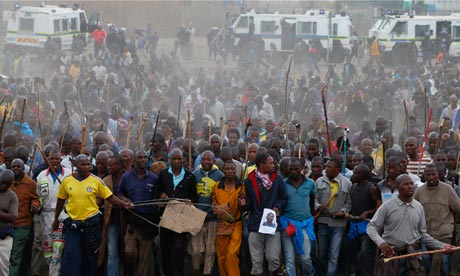
[Protesting mineworkers at Marikana mine in South Africa, September 5, 2012. Photograph by Mike Hutchings/REUTERS.]
The Marikana Massacre, which pitted police against striking miners, labor against capital, and in the minds of many the state against the people, serves as a brutal and grim reminder of just how divided post-Apartheid South Africa is. The Mandela Miracle, never a miracle at all but rather the culmination of decades of struggle and suffering and thus the opposite of divine intervention, has given way as the years have passed to a South Africa still divided along the fault lines of race and class, urban and rural, power and powerlessness.
The specifics of the tragedy are reasonably well known — miners went on a wildcat strike, Lonmin’s, the company that owns the platinum mine in South Africa’s northern reaches, refused to yield and instead dug in their heels. Violent clashes between miners and police turned deadly. The result was a massacre in which dozens were killed, score wounded, a description all too reminiscent of some of the more famous massacres in the Apartheid era.
Even as some came to call for a re-evaluation of the relationship between the state, capital and the workers, Lonmin’s rushed with unseemly haste to reassure skittish investors. The root causes of this particular tragedy are undeniably complex, but those complexities all point to a fairly simple reality: South Africa’s decisions are deep. And while they may not be irreconcilable, reconciliation is not going to come easily.
In December the ANC will gather at Mangaung, the governing municipality for Bloemfontein (a name change, or adjustment, that speaks volumes) in the Free State, which during the Apartheid years was a stronghold of white nationalism. And at that gathering the party will determine its course, likely for the next five or six years. As with the Polokwane conference in 2007, in which Thabo Mbeki was ousted as party president, which paved the way for his premature evacuation from the country’s presidency months later, Mangaung could prove to be fatal to the current president’s future.
Jacob Zuma does not face a single figure behind which a determined opposition can gather like the one he represented for Mbeki five years ago. And yet if anything, that absence of a singular unifying force makes Mangaung so compelling and worrying and fascinating and, from Zuma’s vantage point, fraught. Opposition parties, led by the largest such party, the Democratic Alliance (DA), and the once-promising but perpetually floundering Congress of the People (COPE), are calling for unity in advance of Mangaung. Such unity could be deeply threatening to the ANC and, if recent history is any guide, seems highly unlikely.
And of course outside parties are hardly the ANC’s only problem. Indeed, Mangaung will be about ANC politics, with the opposition parties tenting their fingers in anticipation of a political maelstrom from which they hope to benefit. A unified ANC, after all, gives no hope to the DA or COPE or any of the myriad other parties that freckle South African politics. But an ANC in the midst of internecine warfare? Well, that’s the chaos of opportunity.
And right now the deep divisions within the ANC are what give indications that allow for all sorts of speculation, all of which I heard from people across the spectrum in South Africa when I was there and talking to people in June and July. Will the party fracture? If so will the fracturing come from internal ideological divisions or from regional fissures that threaten to tear the party asunder? Will Julius Malema, the firebrand former (and still in some circles de facto) leader of the Youth League find a way to mobilize enough support to provide a real challenge to Zuma? (Depending upon the speaker, Malema’s promise inspired everything from barely concealed terror to forthright glee.) Is it possible that Thabo Mbeki, of all people, will rise from the political ashes?
So many of these questions point to the politics of personality in South Africa. And these personalities all seem to have one focus: Jacob Zuma. Whether we are talking about Malema v. Zuma, or Congress of South African Trade Unions head Zwelinzima Vavi v. Zuma, or former Interim President Kgalema Mothlante (who finished Mbeki’s aborted term and has clear aspirations to the office again) v. Zuma, or even Mbeki v. Zuma it is clear that in South Africa right now heavy lies the head that falls to sleep on the pillows in Genadendal and Mahlamba Ndlopfu. And if Zuma sleeps restlessly it must be because an alliance of those lined against him could very well spell the end of his time in power. And if Zuma’s time in power ends prematurely he may well not have the political heft to forestall any longer a range of criminal and civil charges against him.
Marikana revealed and exacerbated, but did not create, these schisms. Mangaung is around the corner. Marikana will surely cast a large and foreboding shadow.